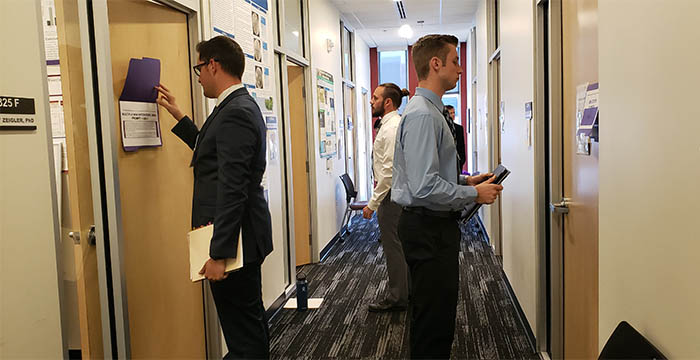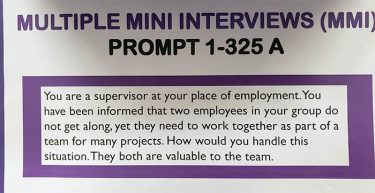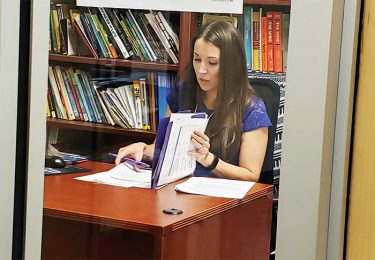
By Lana Sweeten-Shults
GCU News Bureau
Just call it the concentrated juice of the interview world.
Or speed dating to find that perfect … university.
Multiple mini-interviews are the trendy format of the interview world, if interview formats can be called trendy.

“A lot of universities are now conducting MMIs to assess noncognitive skills as part of the holistic interview process, and I want our students to gain a competitive edge,” said Rosanne Magarelli, Grand Canyon University Student Success Specialist with Strategic Employer Initiatives & Internships.
With so many medical schools adopting this popular interview format on steroids, GCU organized its first MMI, as it's affectionately called, to prepare students for the rigors of those types of interviews.
Magarelli recently organized a mock multiple mini-interview for students in the College of Science, Engineering and Technology who are on the cusp of applying for medical school.
Ten pre-med, pre-veterinary and pre-physician assistant students, dressed in their interview best, joined in the event on the third floor of CSET for nine 10-minute rounds of MMIs at structured interview stations.
Nine instructors took on the role of interviewers, including seven GCU instructors -- Dr. Stephanie Stang, Dr. Donna Gerakos, Dr. David Jackson, Dr. Karen Denzler, Trevor Nordin, Michael Bodeen and Gail Francis. Guest interviewers were Gabriella Woody, University of Arizona Outreach Coordinator for Diversity and Inclusion, and Deanna Hughes, Associate Director of Residential Admissions for A.T. Still University, School of Osteophathic Medicine in Arizona.
“You have 2 minutes to read your prompt,” said a student worker on a mini public address system – actually a karaoke machine Magarelli brought in for the mock scenario.
That’s when the students, standing in front of closed doors in two hallways, opened a closed folder, where a question was presented to them, such as this one: “You are a family physician seeing Lela, a 67-year-old Korean-American woman with a recent history of multiple fragility fractures. You diagnose her with osteoporosis and prescribe some bisphosphonate drugs and other pharmacological treatments. Lela tells you that she and her family prefer to practice Eastern, alternative medicine treatments, such as herbal therapies and acupuncture. She is adamant on trying these methods first.

“You are concerned about the use of these alternative medicine treatments and the possible negative effects they could have on Lela’s health. How would you approach this case with the patient – what would you recommend for Jane to do?”
Here’s another prompt:
“You have a 52-year-old patient who arrives at your outpatient clinic with his mother. The mother tells you in front of her son that they are there because her son needs to quit drinking. She also informs you that the Big Gulp cup that her son is holding is filled with vodka and soda. How do you address the situation?”
After reading the prompt, the student worker announces the interviewees can enter the room to speak to the interviewer and answer the question. After 7 minutes, the student worker in an adjacent hallway announces to the students and interviewers that they have 1 minute to complete the interview before heading to the next station for the next 10-minute round.
“The questions are thought-provoking,” Magarelli said in her instructions before the mock MMI but also told students to “take a breath. Trust yourself. All of you have experiences. … It’s OK to be nervous.”
The McMaster University Medical School began developing the MMI system in 2001 after realizing that traditional interview formats do not necessarily predict a student’s performance in medical school. Interviewers wanted to try a different way to assess medical school applicants.
The system also was designed in response to patient complaints about doctors to a licensing or regulatory body. In most of those complaints, patients aren't questioning a doctor's knowledge of his or her discipline but instead are concerned about a doctor’s noncognitive skills, such as ethical or moral judgment or professionalism.
Since being adopted by McMaster in 2004, the MMI format has been adopted by numerous other medical, dental, pharmacy and veterinary schools.
MMIs are designed to give interviewers – in this case, medical schools – a broader picture of applicants beyond the traditional resume list of their grades or extracurricular activities.
Questions are designed to assess an applicant’s noncognitive qualities – those qualities beyond just grades – that give insight into cultural sensitivity, empathy, ethical gauge or how well someone might work with a team.

Magarelli told students the mock MMIs “are to get you so competitively ready for your career. All you need is practice.”
“I was pretty nervous at first,” said pre-dental major Aldair Barranco, one of the 10 students invited to hone their interview skills in the MMI. “Some of the questions are tough. But I feel it (the MMI) is emulating correctly what an actual interview would be like.”
Pre-veterinarian major Amanda Gonzales managed to quell her nerves despite the tough questions.
She said of the quick series of mini-interviews, “It’s a lot of fun, actually. I’m learning a lot about my capabilities. I’m surprising myself. I didn’t think I would answer some of the questions the way I did.”
Pre-med major Scott Austin, who has gone through multiple mini-interviews before, appreciated the practice time – anything to help him land a spot in medical school. “Honestly, it’s to reduce the anxiety,” he said, “It’s a way for you to resort to those feelings of familiarity.”
Magarelli said the exercise was meant to help students sharpen their critical thinking skills as they answer the prompts.
It also gave them the chance to use the STAR interview method – STAR stands for Situation, Task, Action and Result. An interviewee sets the scene (situation), describes what their responsibility was in that situation (task), explains what steps they took to address the situation (action) and shares what outcomes their actions achieved (result).
Interviewers compiled an aggregate score of students' soft skills and gave them feedback. Magarelli considers that information invaluable as GCU wraps up the academic year and gets ready to send its pre-med students onto the next step in their academic career.
“All I wanted for them (the students) is to believe in themselves," she said.
Contact GCU senior writer Lana Sweeten-Shults at [email protected] or at 602-639-7901.



































































